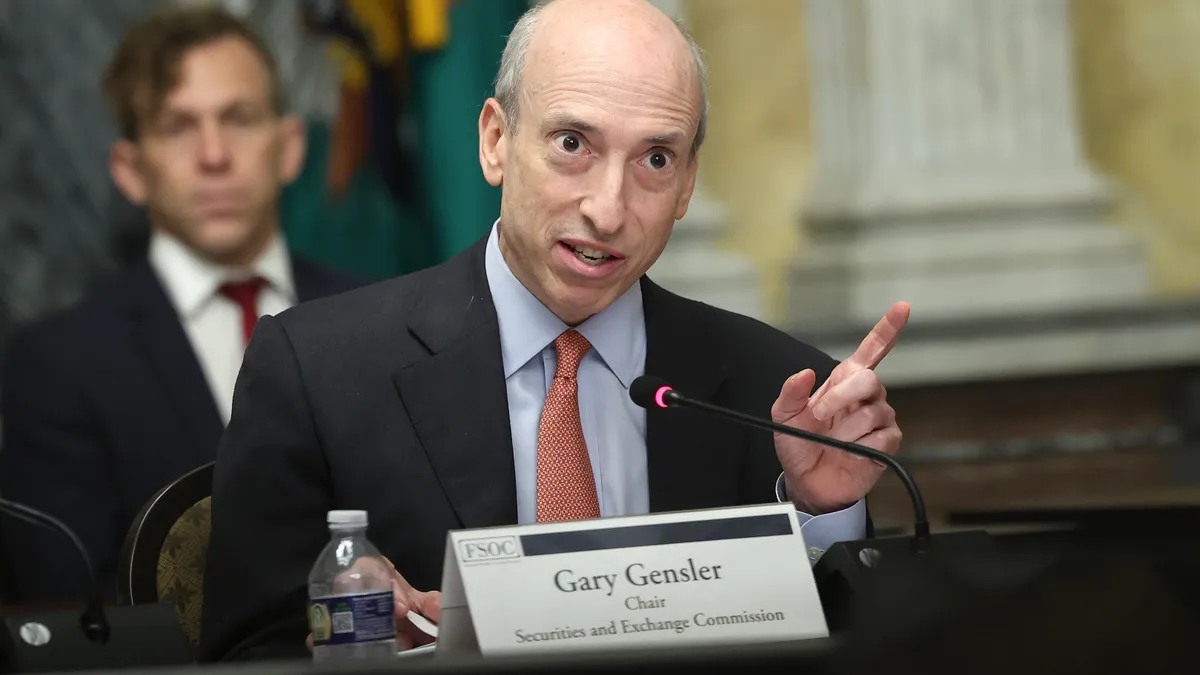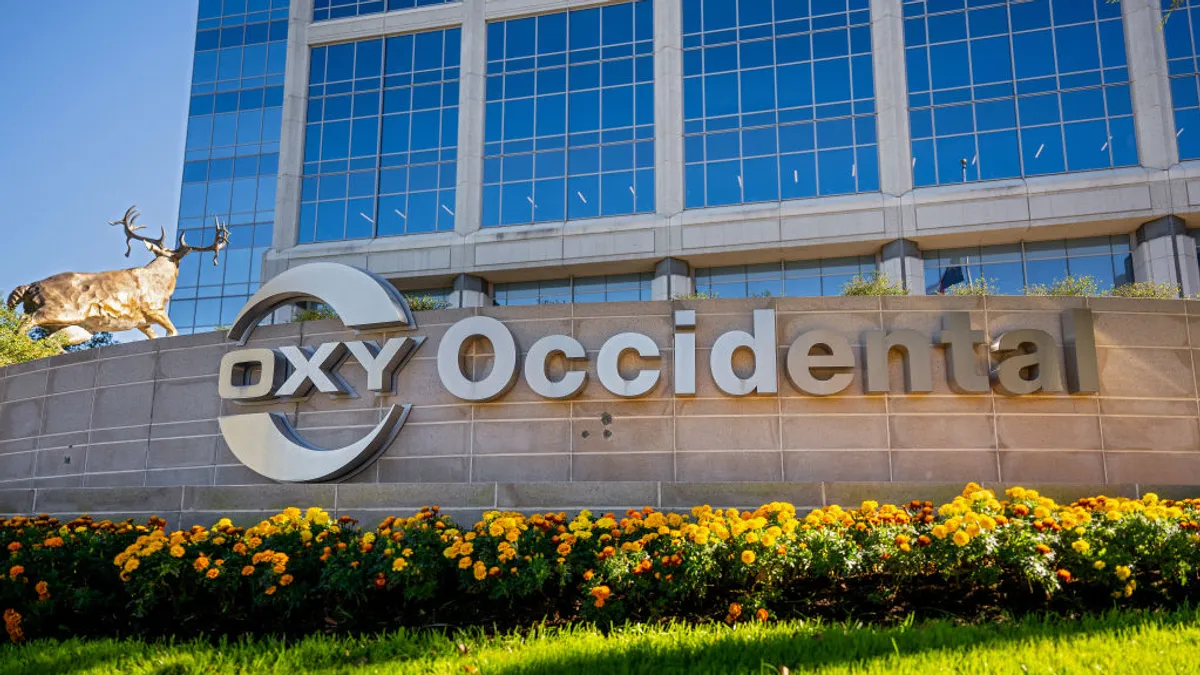The Securities and Exchange Commission is preparing to vote Wednesday morning on a rule proposed nearly two years ago. The agency will consider whether to adopt a regulation requiring public companies to make climate-related disclosures in their registrations and annual reports.
The rule was previously expected to be finalized in October, before the SEC updated that timeline in December and said it would be released in April. The agency beat those expectations by nearly a month, releasing the Sunshine Act Notice last week announcing the March 6 vote.
When the rule was initially proposed, Chair Gary Gensler said “if adopted, [it] would provide investors with consistent, comparable and decision-useful information,” and companies and investors would both “benefit from the clear rules of the road proposed.”
The SEC’s March 2022 proposal prompted a flood of public comments — over 16,000 — and political backlash, leading to multiple delays in the rule’s finalization.
The agency has continued to receive comments on the proposal. The most recent one was submitted on Feb. 29 from 20 law and finance professors, questioning the SEC’s reasoning for the proposal in light of recent high-profile withdrawals and membership revisions from Climate Action 100+. Lawrence Cunningham, George Washington University Law School’s research professor of Law Emeritus, spearheaded the letter and also noted Vanguard left the Net Zero Asset Manager Alliance in 2022 and the Net Zero Insurance Alliance saw nine defections in 2023.
“Such withdrawals call into further question much of the SEC’s stated rationale for the Proposal, including its characterization that such alliances evidence a ‘consensus’ view favoring the Proposal,” Cunningham wrote.
Given the persisting pushback and the impending vote, it’s a good time to take a look at what was in the SEC’s original draft, what is anticipated to change, and what to expect for tomorrow’s commission vote.
What was in the original proposal?
The SEC modeled the proposal’s disclosure framework, in part, based on the Task Force for Climate-Related Financial Disclosures’ recommendations, as well as the work of the Greenhouse Gas Protocol, the proposed rule said. TCFD has since disbanded — following its final report last year — and its work is now under the oversight of the International Sustainability Standards Board.
The proposal would require public companies to disclose a number of details related to how they manage climate risk. Among these are the company’s oversight and governance structure for climate risk, as well as its processes for identifying such risks; how identified risks have had or are likely to have “a material impact” over the short-, medium- or long-term; its scope 1 and scope 2 emissions; and its scope 3 emissions “if material” or if the company has set a target that includes scope 3.
The proposal would also require companies to disclose any climate-related goals and transition plans, if they have developed any.
When determining materiality, the SEC will require public companies to do a line-item accounting of the impacts of any climate-related risks and expenditures that are 1% or higher of a total line item for the fiscal year.
The rule also takes a single materiality approach, only requiring companies to disclose issues deemed material to investors, compared to the double materiality standard used by the European Union’s Corporate Sustainability Reporting Directive. The CSRD requires companies in its purview to also report how their businesses’ impact the environment and the public. Last year, Gensler warned that if the SEC didn’t publish a final climate disclosure rule or if the rule was overturned by the courts, American businesses would be at the behest of the EU’s climate disclosures.
What’s anticipated to change?
ESG Dive has not yet seen the text of the final proposal the commission will be voting on Wednesday. However, reports have emerged that several high-profile components of the rule may be diminished or absent entirely.
Scope 3 emissions — which accounts for emissions generated by entities in a company’s supply chain but not owned or operated by the reporting company — proved to be the rule’s most contentious issue.
Gensler told the U.S. Chamber of Commerce last fall the agency was being careful not to overstep its authority with regards to scope 3, and ensure it doesn’t “indirectly sort of do what [the SEC] can’t do directly … regulate nonpublic companies.” By January, experts and corporations were doubtful scope 3 would make the final cut.
Reuters first reported last month that scope 3 disclosure requirements were out of the latest draft. Politico also reported scope 3 had hit the chopping block, but went further and said the draft also pares back reporting requirements on public companies around scope 1 and scope 2 emissions.
While neither confirming nor denying the exclusion of scope 3 requirements, an SEC spokesperson previously told ESG Dive the agency takes all the public feedback on the proposals, then considers “possible adjustments to the proposals and whether it’s appropriate to move forward to a final adoption.”
However, regardless of whether scope 3 disclosures are required by the SEC’s final rule, analysts at KPMG have said that large companies will still likely have to report scope 3 emissions to other jurisdictions, like the EU and California — which passed its own climate disclosure laws in 2023 with scope 3 reporting requirements.
Erin Martin and Celia Soehner, partners at law firm Morgan Lewis who both previously served at the SEC, agreed with KPMG’s assessment and said in an emailed statement to ESG Dive that if scope 3 is ultimately omitted, companies will have to determine how they plan to comply with “other, more stringent regulatory requirements.”
What to expect Wednesday?
While the meeting is scheduled to start at 9:45 am EST, the climate disclosure rule is the second item on the agenda.
First, the commission will consider adopting amendments to disclosure requirements of stock order executions under the Securities Exchange Act of 1934. The amendments would expand the scope of entities subject to the requirements and require reporting entities to submit summary reports of execution quality. The amendments would also change the order and categorization of information required to be submitted.
After consideration of those amendments are complete, then comes the disclosure rule. The commission is chaired by Gensler, appointed by President Joe Biden in 2021, along with two other Biden appointees and two members appointed by former President Donald Trump.
Once the rule is voted on, the commission could choose to adopt an amended version of the rule, approve the rule with exceptions, or the rule could fail altogether, based on prior proceedings.
If the rule is ultimately approved in some form Wednesday, questions will still remain for corporations as they determine their compliance mechanisms, according to Martin and Soehner.
“While many public companies appreciate the reassurance of timing with respect to final rules, the remaining uncertainties as to phase-in dates for compliance and the ultimate impact of legal challenges to the final rules remain significant areas of concern,” the pair told ESG Dive.
The meeting will be streamed live on the SEC’s site.




















